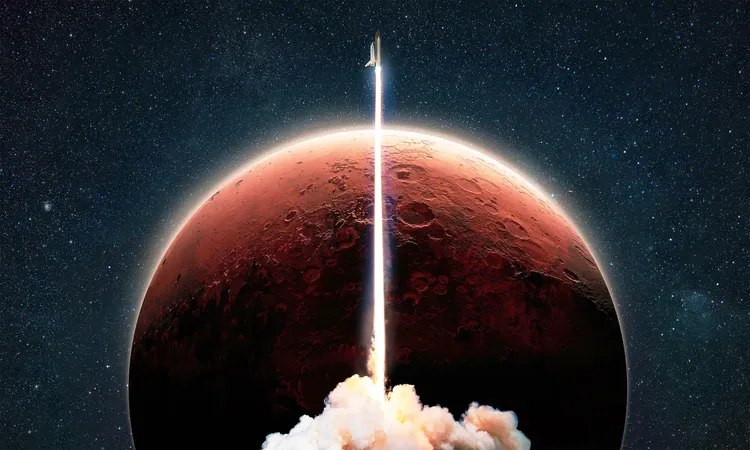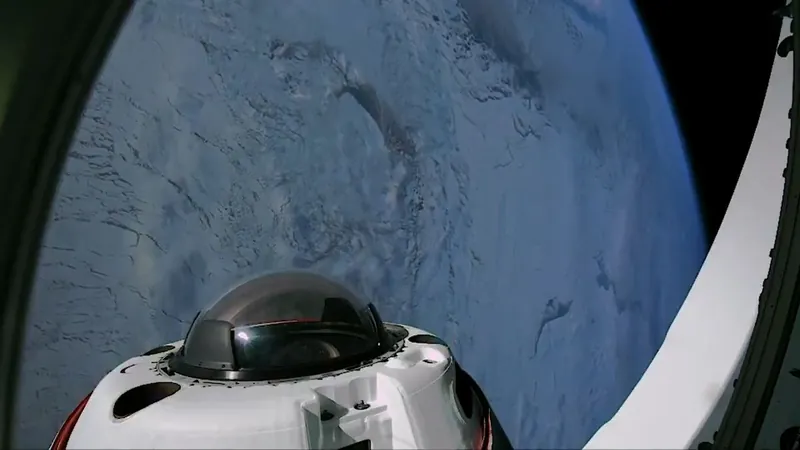
Astronauts Face Kidney Risks on Mars Mission: What You Need to Know!
2025-03-31
Author: Yan
Introduction
As humanity inches closer to interplanetary exploration, particularly with ambitious missions to Mars, researchers are uncovering vital health concerns that could jeopardize these journeys. Chief among these issues? The health of astronauts' kidneys, which may be severely impacted during long-duration space missions.
Research Overview
Recent studies reveal that the kidney could be the weak link in the human body when exposed to the harsh realities of space travel. As the risks of developing kidney stones and enduring permanent damage increase, scientific insights into these issues have become crucial for future missions.
The groundbreaking research led by Dr. Keith Siew from the London Tubular Centre involves a collaboration of over 40 institutions worldwide. By analyzing extensive data from more than 20 research cohorts and over 40 missions to the International Space Station (ISS), along with simulations involving mice, the study is touted as the most comprehensive examination of kidney health in space to date.
Key Findings
Findings indicate that space travel alters both the structure and function of kidneys, with galactic cosmic radiation posing a particular threat. Currently, astronauts in Low Earth orbit benefit from some protection due to Earth’s magnetic field; however, a trip to Mars would expose them to full cosmic radiation, which has previously only been experienced by a handful of lunar astronauts during short excursions.
One alarming discovery shows that after just a month in microgravity conditions, kidney tubules—responsible for the crucial balance of salts and calcium—shrink, increasing the likelihood of kidney stones. This contradicts earlier assumptions that kidney stone formation in space was primarily due to bone loss and elevated calcium levels in urine.
Long-Term Implications
The situation worsens when considering longer missions. Research indicates that cosmic radiation infiltrates space capsules, leading to irreversible kidney damage after exposure that mimics up to 2.5 years of spaceflight conditions. Dr. Siew emphasizes that current knowledge of astronauts' health is limited, particularly regarding the prolonged effects of deep space radiation, raising concerns for future Mars missions.
If new protective measures for kidneys are not established, astronauts might face the grim prospect of needing dialysis either during their return journey from Mars or upon arrival on Earth. As kidney damage often presents significant challenges, it may be too late to address these issues when symptoms finally arise.
Broader Implications
The implications of this research go beyond interstellar journeys; advancements made to protect astronauts could also benefit medical treatments on Earth. Innovations could potentially enhance the kidneys' ability to handle higher radiotherapy doses in cancer treatment, presenting a dual opportunity for advancements in space and terrestrial health.
Conclusion
The extensive findings serve as a launchpad for future studies aimed at mitigating these risks. Moving forward, safeguarding astronauts’ kidney health will be paramount in planning extended missions, ensuring crews remain healthy on journeys that stretch far beyond any undertaken before.
In conclusion, as we travel beyond our planet, it is clear we must pay close attention to our body's responses to the cosmos—especially for our kidneys. The research underlines the urgency of developing solutions to ensure that humanity can safely venture to Mars and beyond. Buckle up, space enthusiasts; the journey has only just begun!




 Brasil (PT)
Brasil (PT)
 Canada (EN)
Canada (EN)
 Chile (ES)
Chile (ES)
 Česko (CS)
Česko (CS)
 대한민국 (KO)
대한민국 (KO)
 España (ES)
España (ES)
 France (FR)
France (FR)
 Hong Kong (EN)
Hong Kong (EN)
 Italia (IT)
Italia (IT)
 日本 (JA)
日本 (JA)
 Magyarország (HU)
Magyarország (HU)
 Norge (NO)
Norge (NO)
 Polska (PL)
Polska (PL)
 Schweiz (DE)
Schweiz (DE)
 Singapore (EN)
Singapore (EN)
 Sverige (SV)
Sverige (SV)
 Suomi (FI)
Suomi (FI)
 Türkiye (TR)
Türkiye (TR)
 الإمارات العربية المتحدة (AR)
الإمارات العربية المتحدة (AR)